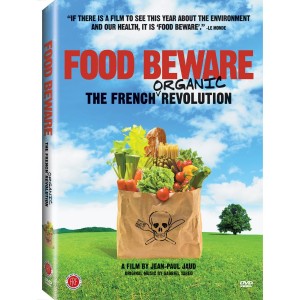This documentary (available on Netflix) was inspiring.
It details the story of a mayor in Barjac, France, who embarked on a mission that involved feeding organic food to all the school children for one academic year. It chronicled the various aspects of the journey, including working with the parents, the community, the farmers, and the politics around agricultural policies. While some parts of the movie dragged on a bit, overall the message was fascinating, and inspiring.
In case you don’t want to take the time, or don’t like watching subtitled films….here are my main takeaways:
“Feed the soil, not the plant.”
The most powerful message I took away from this movie was this very statement. There were several scenes showing a round table discussion amongst a mixture of farmers, some organic, some not. When the non-organic farmers were challenging the organic farmers as to how they were able to ward off powdery mildew (and other plant diseases), their response was that they rarely had any problems with those diseases. They said they concerned themselves with feeding the soil, not the plant. Because a plant fed by the nutrients in the rich organic soil builds up its strength to naturally defend itself against outside diseases, where the non organic farm plants, which are planted in dead soil, need all those chemicals to keep diseases away because they have no inherent strength. (also a reason why organic foods contain more nutrients than their conventionally grown counterparts).
(This point baffled the non-organic farmers by the way)
To me, this is the main tenet of holistic health. Rather than concern oneself with what chemicals (drugs) we can use to combat illness and symptoms brought on by poor nutrition, if we concern ourselves with feeding our bodies the proper nutrients in order to build a strong immune system, we won’t need to deal with dis-ease.
It does take a village.
There is a touching scene where the children are all eating their lunch, and the chef came over and noticed a little boy was not eating his carrots. He commented that the little boy needed to eat his carrots or there would be no dessert. The little girl sitting next to him was also telling the chef she was trying to get him to do that as well. It was incredibly touching that the chef would a)notice, and b) want to make sure that the children ate healthily. The genuine caring was palpable.
It takes just one person with a vision to start to make change.
By taking the lead, the mayor was able to open the minds of the parents in the community. There were many parents, who because of the program that started at the school, began implementing some organic foods into their meals at home.
Engage the children in the process along the way.
Rather than just telling them that this was how it was going to be, the mayor, the teachers, and the school chefs involved the children throughout the process of changing the way things were. They grew a garden on the school property and learned how to plant, nurture, and harvest their food. They admitted they weren’t sure how this was going to go, but that they wanted to make it great for the children, and wanted their input.
There was a great scene towards the end of the movie where they are having a debriefing session, a q&a if you will, with the school children. They were discussing which meals were their favorites, and which ones they liked less. Then, there was a pivotal moment where the children were talking about a meal that had used to be their favorite before they implemented the organic program. The chef was explaining how they make the breaded turkey they used to buy pre-made. He was detailing how the meat wasnt’ really even turkey. He talked about how fillers were added, the meat was ground up and shaped to look like something natural, and on and on. The camera pans to the various school children with grimace after grimace when they were hearing what they used to eat, from the reference point of having eaten healthy and organic, non-processed foods for a year.
The beautiful thing about it was that by engaging the children in the process, they also came to the same conclusion of what is best for them without it being forced upon them because the grown ups “said so.” It’s what I have always tried to teach my clients who have children, and what I try to do with my own daughter. Rather than telling her no, not good for you, I explain how it affects my body when I eat it, and that I choose not to eat things that make me feel a certain way. I model for her how I make my food choices, so that she can learn how to make hers.
Summary
I would recommend this movie for anyone interested in seeing a grass roots program that began without a real understanding of the outcome, but had a great intention. It would be incredible if we could get something like this going here in the United States – and I believe we can. I’ve been working with my daughter’s school to change and shift some of the food policies, in order to collectively improve the health of our children. I’m starting there, but look forward to working directly with more schools in the area to move this idea along.

Leave a Reply